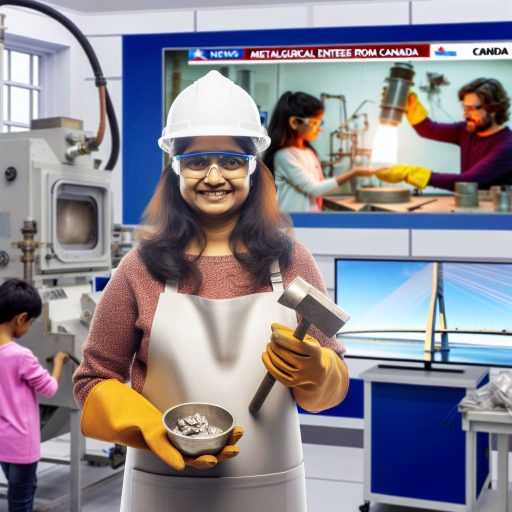Introduction to Metallurgical Engineering
Metallurgical engineering plays a crucial role in various industries.
It focuses on the properties and behaviors of metals and alloys.
This branch of engineering combines principles of materials science and engineering.
Metallurgists work to improve existing materials and develop new ones.
They aim to enhance the performance and reliability of metals in applications.
Importance of Metallurgical Engineering
Metallurgical engineering significantly impacts manufacturing processes.
It aids in developing strong, lightweight materials for aerospace and automotive industries.
Moreover, it influences the construction sector with durable metallic structures.
Metallurgists ensure that metals perform well under various conditions.
They contribute to energy efficiency and safety in engineering projects.
Career Opportunities
Various industries seek skilled metallurgical engineers.
Opportunities exist in aerospace, automotive, and electronics sectors.
Additionally, metallurgists find roles in research and development.
They may also work in quality control and materials testing labs.
Furthermore, they can pursue careers in academia and consulting.
Skills Development
Metallurgical engineering cultivates essential skills and knowledge.
Engineers develop analytical skills for problem-solving and decision-making.
They learn to use advanced software and modeling techniques.
Furthermore, teamwork and communication skills are vital in this field.
These skills lead to effective collaboration in interdisciplinary teams.
High Demand for Metallurgical Engineers in Various Industries
Growing Industries Require Expertise
Metallurgical engineers are critical in many sectors, including aerospace and automotive.
They ensure materials can withstand extreme conditions and high stress.
Moreover, industries such as electronics rely on their knowledge of metals.
Increasing demand leads to abundant job opportunities in this specialized field.
Key Sectors Seeking Metallurgical Engineers
- Aerospace: Developing lightweight materials for aircraft.
- Automotive: Improving engine performance and safety standards.
- Construction: Engineering strong, durable materials for infrastructure.
- Energy: Innovating materials for renewable energy sources.
- Electronics: Creating efficient conductive materials for technology.
Job Stability and Growth
The job market for metallurgical engineers continues to expand.
Unlock Your Career Potential
Visualize a clear path to success with our tailored Career Consulting service. Personalized insights in just 1-3 days.
Get StartedMany companies are investing in new technologies and materials.
This trend indicates a strong future for metallurgical engineering careers.
Furthermore, these engineers often enjoy competitive salaries and benefits.
Educational and Skill Requirements
Obtaining a degree in metallurgical engineering is essential for entering this field.
Hands-on experience through internships can provide a significant advantage.
In addition, engineers should develop skills like problem-solving and critical thinking.
Staying updated with technological advancements is crucial for career progression.
Career Opportunities and Job Roles in Metallurgical Engineering
Overview of Metallurgical Engineering Careers
Metallurgical engineering offers diverse career paths in multiple sectors.
Professionals in this field work on the development and processing of metals.
They focus on improving metal performance and sustainability.
This discipline integrates principles from materials science and engineering.
Common Job Roles
Various roles exist for metallurgical engineers across industries.
Some common job titles include:
- Materials Engineer
- Metallurgical Process Engineer
- Quality Control Engineer
- Research Scientist
- Product Development Engineer
Industries Employing Metallurgical Engineers
Metallurgical engineers find opportunities in several key industries.
These include aerospace, automotive, and construction industries.
Additionally, they work in electronics and energy sectors.
Manufacturing companies also seek their expertise for production processes.
Responsibilities of Metallurgical Engineers
Metallurgical engineers have various responsibilities in their roles.
They design and conduct experiments to test new materials.
Moreover, they analyze the properties of metals and alloys.
Additionally, they troubleshoot production problems in manufacturing processes.
They also ensure compliance with industry standards and regulations.
Skills Required for Success
Successful metallurgical engineers possess certain essential skills.
Strong analytical and problem-solving skills are crucial for this field.
Effective communication skills enhance collaboration with team members.
Furthermore, proficiency in computer-aided design software is beneficial.
Finally, a solid understanding of materials science is foundational.
You Might Also Like: Tips for Aspiring Aerospace Engineers in Canada
Competitive Salary and Benefits in the Metallurgical Engineering Field
Attractive Salary Packages
Metallurgical engineers enjoy attractive salary packages across industries.
The average salary varies depending on experience and location.
However, many professionals find their income to be above average.
Companies like TechMetals Inc. offer competitive starting salaries.
As engineers gain experience, their salaries typically increase significantly.
Comprehensive Benefits
In addition to salaries, many companies provide comprehensive benefits.
These benefits often include health insurance for employees and their families.
Life insurance and retirement savings plans are also commonly offered.
Firms like Alloys Group ensure employees have access to well-rounded benefit packages.
Job Security
The metallurgical engineering field is known for its job security.
With increasing demand for metals and materials, jobs are plentiful.
Industries such as aerospace and automotive require skilled metallurgists.
Job security often leads to peace of mind for professionals in this field.
Potential for Advancement
Career advancement opportunities are abundant in metallurgical engineering.
Many engineers move into managerial or specialized roles over time.
Companies frequently support further education and certifications.
This encourages growth and promotes career development.
Work-Life Balance
Many metallurgical engineers enjoy a favorable work-life balance.
Most positions offer regular hours, allowing for personal time.
Flexible working arrangements are increasingly common in the industry.
As a result, professionals can manage both work and home responsibilities effectively.
See Related Content: The Role of Chemical Engineers in Environmental Safety
Contributions to Sustainability and Environmental Protection
Advancing Sustainable Materials
Metallurgical engineering plays a significant role in developing sustainable materials.
Engineers focus on creating alloys that are lighter and stronger.
These materials reduce energy consumption in various applications.
Moreover, selecting recyclable metals minimizes waste in the environment.
Enhancing Resource Efficiency
Metallurgical engineers enhance resource efficiency through innovative processes.
They explore techniques such as reuse and recycling of metals.
By implementing efficient production methods, they lower material costs.
This efficiency leads to reduced environmental impacts and waste generation.
Reducing Carbon Footprint
A significant benefit of metallurgical engineering is its potential to reduce carbon emissions.
Engineers work on processes that utilize renewable energy sources.
They also develop materials that require less energy to produce.
By minimizing the carbon footprint, they contribute to global sustainability goals.
Promoting Environmental Remediation
Metallurgical engineers also contribute to environmental remediation efforts.
They design processes that can recover valuable metals from waste streams.
This recovery reduces pollution and conserves natural resources.
Additionally, they work on solutions for cleaning contaminated sites.
Innovating for a Circular Economy
Metallurgical engineers are key players in advancing the circular economy.
This involves designing materials and processes that prioritize recycling.
They create systems that allow materials to be used repeatedly.
Consequently, this design philosophy minimizes waste and maximizes resource utilization.
You Might Also Like: Mechatronics vs Mechanical Engineering in Canada

Advancements in Technology and Innovation for Metallurgical Engineers
Emerging Technologies in Metallurgy
Metallurgical engineering sees rapid technological advancements today.
Innovations enhance the capabilities of metallurgical processes.
For instance, additive manufacturing is transforming metal fabrication.
This technology allows for the creation of complex geometries.
Moreover, it reduces waste and improves efficiency significantly.
Smart Manufacturing and Automation
Automation increasingly influences metallurgical engineering.
Smart manufacturing integrates IoT in production processes.
This integration enhances monitoring and control of operations.
As a result, it leads to improved productivity and consistency.
Companies now deploy robotics for precision tasks in the industry.
Research and Development Initiatives
Ongoing R&D drives innovation in metallurgy.
Universities and industries collaborate to tackle new challenges.
Research focuses on developing advanced materials and alloys.
Such efforts support industries like aerospace and automotive.
These fields require materials that withstand extreme conditions.
Environmental Considerations
Sustainability has become essential in metallurgical engineering.
New technologies aim to reduce carbon footprints of processes.
For example, recycling initiatives enhance resource efficiency.
Engineers now prioritize eco-friendly materials and methods.
This shift addresses both environmental and economic goals.
Future Trends in Metallurgical Engineering
The future promises exciting advancements for metallurgical engineers.
Nanotechnology is set to revolutionize material properties.
These innovations will yield stronger, lighter, and more durable materials.
Additionally, digital twins will enhance product development cycles.
Overall, these trends position metallurgical engineering at the forefront of innovation.
You Might Also Like: Certifications That Boost Aerospace Engineering Careers
Interdisciplinary Nature of Metallurgical Engineering and Collaboration
Defining Metallurgical Engineering
Metallurgical engineering combines principles from various scientific disciplines.
It involves chemistry, physics, and materials science.
This integration creates a dynamic field with diverse applications.
Collaboration Across Disciplines
Professionals frequently work alongside chemists and physicists.
They collaborate on projects that require specialized knowledge.
This teamwork enhances problem-solving capabilities.
For example, developers might partner with metallurgists for new alloy designs.
Impact on Industry and Research
Metallurgical engineers play a critical role in manufacturing industries.
They contribute to advancements in aerospace, automotive, and electronics sectors.
Their expertise drives innovation and efficiency in production processes.
Real-World Applications
In the aerospace industry, engineers develop lightweight materials.
These materials improve fuel efficiency while maintaining structural integrity.
In electronics, they innovate materials for better conductivity and performance.
Such collaborations lead to significant technological advancements.
Opportunities for Continuous Learning
The interdisciplinary nature fosters continual professional growth.
Engineers stay updated on emerging technologies and methodologies.
This engagement nurtures a culture of lifelong learning.
Contributing to Society
Metallurgical engineering also contributes to sustainable practices.
Engineers develop materials that minimize environmental impact.
This focus on sustainability aligns with current global trends.
Personal and Professional Development Through Continuous Learning
Emphasis on Lifelong Learning
A career in metallurgical engineering constantly evolves with new technologies.
This field fosters a culture of lifelong learning and adaptability.
Engineers often engage in professional development courses and workshops.
Additionally, they can pursue certifications to enhance their skills.
Opportunities for Specialization
Metallurgical engineering offers various specialization options.
You can focus on areas such as materials science or metal processing.
Specializing allows you to deepen your expertise and advance your career.
Furthermore, it keeps you engaged and motivated in your work.
Networking and Collaboration
Engaging in continuous learning provides great networking opportunities.
Conferences and professional organizations connect you with industry experts.
Networking enhances your knowledge and opens doors for career advancement.
It also facilitates collaboration on innovative projects and research.
Staying Current with Industry Trends
The metallurgical industry frequently sees new advancements and changes.
Continuous learning helps you stay informed about industry trends.
This knowledge makes you a valuable asset to your employer.
It also increases your employability throughout your career.
Personal Growth
Learning new skills leads to personal growth and confidence.
Challenging yourself fosters resilience and adaptability in various situations.
Additionally, it instills a sense of achievement and fulfillment in your work.
Ultimately, continuous learning enriches both your professional and personal life.
Additional Resources
Is getting a Metallurgy Engineering Degree worth it ? : r/metallurgy
How much do Materials Science and Engineering Industry Jobs pay …




